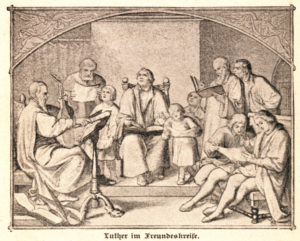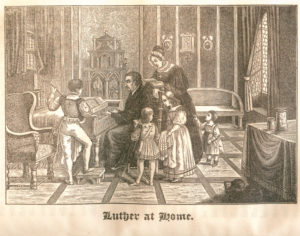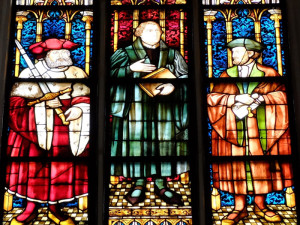by Rev. Travis Berg
 Modern life is compartmentalized to the point of schizophrenia. The various areas of our lives like our jobs, our families, and even the faith seem to be discrete and disconnected from each other. Compartmentalization has many benefits, but one of its drawbacks is that we end up leading many different lives with no unity or integration.
Modern life is compartmentalized to the point of schizophrenia. The various areas of our lives like our jobs, our families, and even the faith seem to be discrete and disconnected from each other. Compartmentalization has many benefits, but one of its drawbacks is that we end up leading many different lives with no unity or integration.
This was not the case for Dr. Martin Luther. For Luther, theology wasn’t “shop talk” to be interrupted by social and familial concerns. Theology was not an ivory tower endeavor, to be done in the hallowed halls of academia. Theology was not one activity among others. Theology did not stand at the periphery of human existence. For Luther, theology stood at the center of life. Theology was discussed over a home-cooked meal and a mug of good beer. In no place is this clearer than in his Table Talk,
 Theology was the great integrator and interpreter of Luther’s life. Mundane experiences were used by the great doctor as illustrations describing divine judgment, God’s grace, or the nature of faith. Once, when Dr. Luther was holding his son Martin on his lap, the child befouled himself. Luther took this occasion to remark: “How our Lord God has to put up with many a murmur and stink from us, worse than a mother must endure from her child!”[1] One of Luther’s famous illustrations is as follows: “The world is like a drunken peasant. If you lift him into the saddle on one side, he will fall off on the other side. One can’t help him, no matter how one tries. He wants to be the devil’s.”[2] Everyday events ought to remind us of biblical truth.
Theology was the great integrator and interpreter of Luther’s life. Mundane experiences were used by the great doctor as illustrations describing divine judgment, God’s grace, or the nature of faith. Once, when Dr. Luther was holding his son Martin on his lap, the child befouled himself. Luther took this occasion to remark: “How our Lord God has to put up with many a murmur and stink from us, worse than a mother must endure from her child!”[1] One of Luther’s famous illustrations is as follows: “The world is like a drunken peasant. If you lift him into the saddle on one side, he will fall off on the other side. One can’t help him, no matter how one tries. He wants to be the devil’s.”[2] Everyday events ought to remind us of biblical truth.
Current events were also discussed by Luther and his family. The proposed Council at Mantua[3] or the fire in Naumburg[4] were not random bits of trivia for Luther. The first event reveals the continual conflict of “the two heads, Christ and the devil, [who] must clash against each other; they can never be reconciled.”[5] The second is a “sign of the great wrath of God.”[6] Nothing is random or by chance, but everything should be interpreted through the lenses of judgment and grace.
 How can we profitably use Table Talk today? Table Talk isn’t a textbook. Luther isn’t always as didactic as we might like him to be in his Table Talk. Sometimes, he jokes with theology, as he did with his wife Katy concerning marriage.[7] Sometimes, Luther speaks in an extreme or unclear way, as he did concerning Christ and the woman at the well.[8] In fact, Luther dared those recording his words to write down his more earthy and outrageous statements.[9] Sometimes, Luther is just wrong, as he is with Copernicus, where he says: “So it goes now. Whoever wants to be clever must agree with nothing that others esteem. He must do something of his own. This is what that fellow does who wishes to turn the whole of astronomy upside down.”[10]
How can we profitably use Table Talk today? Table Talk isn’t a textbook. Luther isn’t always as didactic as we might like him to be in his Table Talk. Sometimes, he jokes with theology, as he did with his wife Katy concerning marriage.[7] Sometimes, Luther speaks in an extreme or unclear way, as he did concerning Christ and the woman at the well.[8] In fact, Luther dared those recording his words to write down his more earthy and outrageous statements.[9] Sometimes, Luther is just wrong, as he is with Copernicus, where he says: “So it goes now. Whoever wants to be clever must agree with nothing that others esteem. He must do something of his own. This is what that fellow does who wishes to turn the whole of astronomy upside down.”[10]
 So, how is Table Talk a benefit for us today? We should emulate Luther’s continual and candid theological talk with his family and with his friends. Our speech should not only be peppered with the Scriptures, but the Scriptures should be mentally masticated. The faith is the great interpreter of our lives, because the cross of Christ stands at the center of our existence.
So, how is Table Talk a benefit for us today? We should emulate Luther’s continual and candid theological talk with his family and with his friends. Our speech should not only be peppered with the Scriptures, but the Scriptures should be mentally masticated. The faith is the great interpreter of our lives, because the cross of Christ stands at the center of our existence.
The Rev. Travis Berg is pastor of St. Paul’s Lutheran Church, Latimer, Iowa.
[1] AE Vol. 54, No. 1615, pg. 158-159.
[2] AE Vol. 54, 630, pg. 111.
[3] AE, Vol. 54, No. 3502, pg. 215.
[4] AE, Vol. 54, No. 3170, pg. 190.
[5] AE, Vol. 54, No. 3502, pg. 215-216.
[6] AE, Vol. 54, No. 3170, pg. 190.
[7] AE, Vol. 54, No. 1461, pg. 153.
[8] AE, Vol. 54, No. 1472, pg. 154.
[9] See numbers 246 and 1525.
[10] AE Vol. 54, No. 4638, pg. 358-359.
